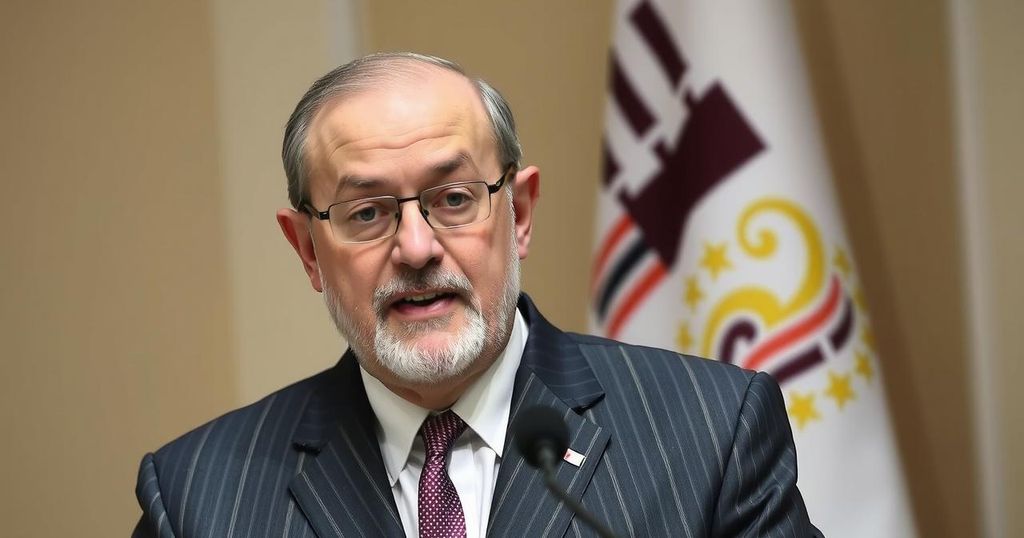Abu Mohammad al-Julani, Syria’s new leader, urges Iran to reconsider its regional policies and expresses hope for a positive role. He indicated potential elections in four years and aims for stability following the transition from Assad’s regime. Julani emphasizes the need for a cohesive governance structure involving diverse Syrian societal groups, while also negotiating with U.S. and Russia for sanctions relief and support in rebuilding Syria post-conflict.
In a recent interview with Al-Arabiya/Al-Hadath, Syria’s new leader, Abu Mohammad al-Julani, also known as Ahmed al-Shara’a, called for Iran to reconsider its regional interventions and expressed hope that Tehran would adopt a more positive role. He highlighted the aspirations of a significant segment of the Syrian populace for constructive Iranian involvement. Julani reaffirmed the completion of significant military operations against Iranian strongholds, despite sustained injuries.
Julani indicated that Syria is on a path towards elections which could take up to four years to materialize. He expressed optimism that the transition from the Assad regime could usher in stability across the Middle East. In pursuit of this aim, he has engaged with numerous Western diplomats and regional countries, addressing new sectarian tensions in cities such as Lattakia and Damascus while maintaining a firm, yet flexible, security posture to manage protests. The return of Syrian soldiers and officers who fled during the regime’s fall has raised questions about the treatment of dissidents.
Reflecting on his role, Julani remarked, “I do not consider myself the liberator of Syria. Everyone who made sacrifices liberated the country.” He accentuated the importance of a smooth power transfer for regional security over the coming decades, particularly in conversations directed toward Gulf audiences. On the matter of drafting a new constitution and ensuring valid elections, he acknowledged the necessity of conducting a comprehensive population census.
Julani’s governance approach aims to integrate the diverse groups across Syria, highlighting the ongoing challenges of control in regions held by external forces, including Turkey and US-backed Syrian Democratic Forces (SDF). He communicated intentions to negotiate with the SDF, underscoring the importance of Kurdish representation. Additionally, he expressed hopes that the new US administration under President Donald Trump would reconsider sanctions against Syria, reinforcing his admiration for Saudi Arabia’s role in the region and hinting at investment opportunities.
Furthermore, he acknowledged Russia’s significant influence in Syria, remarking on its long-standing partnership with the Assad regime, and noted that “Russian statements seemed very positive towards the new authority that has temporarily taken over the country’s administration.”
Overall, Julani’s leadership appears poised to navigate the complexities of Syrian society’s divisions and the diverse political landscape as he seeks to unify the nation under a new governance framework characterized by broader participation and reconciliation.
The backdrop of this analysis involves significant transitions in Syrian leadership following the fall of the Assad regime on December 8. Abu Mohammad al-Julani emerged as a prominent figure, taking over amidst ongoing political instability and strife. His administration faces the challenge of reconciling various factions within Syrian society that have been divided by years of civil war. With Iran, Russia, and the United States having vested interests in the region, Julani’s outreach to these nations reflects a shifting dynamic in Middle Eastern geopolitics, particularly regarding coalition-building and foreign policy.
In conclusion, Abu Mohammad al-Julani’s emergence as Syria’s new leader marks a pivotal moment for the nation as it seeks a path toward stability and unity. His efforts to engage with regional powers and address internal divisions underscore a strategic approach aimed at fostering a more inclusive government. As Syria prepares for future elections and ideological shifts, the importance of diplomatic relations with international players like Iran, Russia, and the United States will be crucial in shaping the country’s evolving political landscape.
Original Source: www.jpost.com






